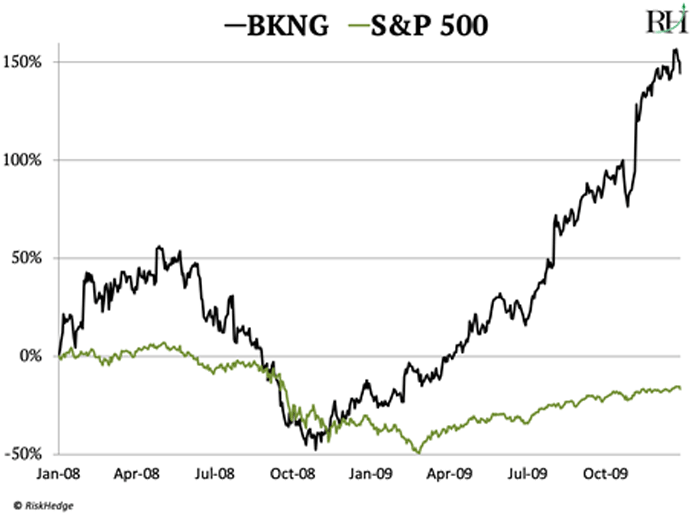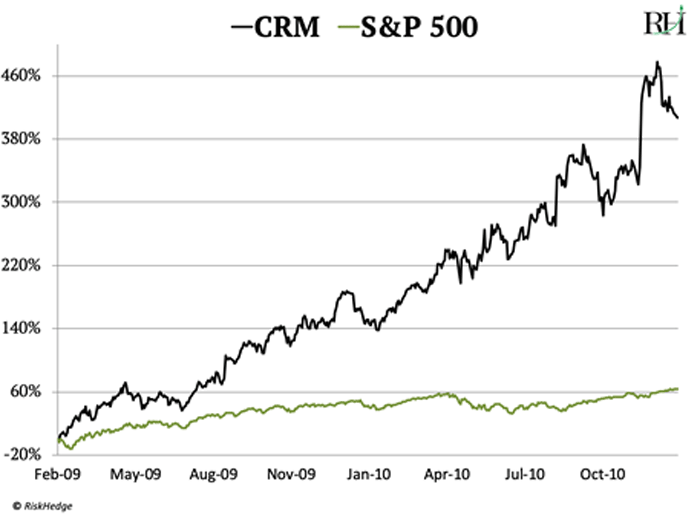What to do With Your Money in a Stocks Bear Market
Stock-Markets / Stocks Bear Market Jan 04, 2019 - 07:30 AM GMTBy: Stephen_McBride
 “Sell everything, I can’t take anymore!”
“Sell everything, I can’t take anymore!”
My stockbroker friend got a phone call from a hysterical client on Christmas Eve.
She was panicking over all the money she had lost in the market… and was demanding to sell her whole portfolio of stocks.
December, as you surely know, was horrendous for U.S. markets.
The S&P fell 10% for its worst December since 1931 during the Great Depression.
In fact, it was the S&P’s worst month overall since February 2009.
- From 2009 to 2017, U.S. stocks posted a gain every single year…
That nine-year winning streak is now over. On Monday the S&P closed out 2018 with a 6% loss.
All this bad news has many investors freaking out that a dreaded “bear market” in stocks has arrived.
Ifwe are in a bear market, there’s likely more downside from here. In the 10 bear markets since the 1920s, stocks fell an average of 32% from their highs.
Meanwhile the S&P has already fallen 17% since peaking in September 2018.
So if we’re in for an “average” bear market, stocks should continue falling.
- Of course, markets often defy averages…
And I’ve heard from a lot of readers who are nervous stocks are headed for a full-blown crash.
So in the rest of today’s letter, we’re going to look at how “disruptor” stocks perform in a worst-case scenario…
Like when U.S. markets cratered 57% during the 2008 financial crisis.
- As regular RiskHedge readers know, “disruptors” are stocks that create, transform, and disrupt whole industries.
“Disruptors” are not ordinary stocks. They don’t come in and compete with industry leaders. They destroy them.
Buy a disruptor early on, before it becomes a household name, and you’ll often stand to make profits of 1,000% or greater.
Take online travel disruptor Priceline (BKNG) for example.
Remember when you had to talk to a travel agent to book a vacation?
Now you can book a whole trip from your computer in under ten minutes.
Priceline was the main driving force behind this disruption.
Its online booking platform dominates the $240 billion global travel services industry. Close to half of all vacations booked online today are booked through Priceline’s network of websites.
- Early investors in Priceline stock earned profits up to 14,000%...
Back in 2007, just before the financial crisis, Priceline was still a small firm with just $140 million in sales.
In the next two years—2008 and 2009—its earnings surged 249%.
Let me repeat that…
During the darkest days of the worst financial crisis since the Great Depression, Priceline’s business didn’t just hold up...
It grew faster than ever.
And its stock price soared 144% from 2008–2009. You can see from this chart it crushed the S&P 500.

- Priceline wasn’t the only disruptor that sailed through the 2008 crisis…
A few months ago we talked about a super-profitable business called the cloud.
In short, the cloud gives businesses cheap access to powerful supercomputers.
Salesforce.com (CRM) pioneered this business two decades ago. Today over 150,000 clients pay Salesforce a monthly fee to use its customer relationship tools. Investors who got into Salesforce stock early booked profits up to 1,750%.
Like Priceline, Salesforce’s profit and revenue growth powered right through 2008 and 2009.
During this period the average S&P 500 company’s earnings tanked by -77%.
Salesforce’s earnings, meanwhile, more than doubled.
Look at the chart below. You’ll see that after markets bottomed in 2009, Salesforce stock rocketed six times higher than the S&P by the end of 2010.

- The financial crisis was barely a speed bump for great disruptor stocks.
Iconic American stocks like Lehman Brothers, Bear Stearns, and Merrill Lynch couldn’t survive 2008. How did these disruptors do it?
It comes down to the difference between a business and a stock price.
The father of “value investing” Benjamin Graham once said:
“In the short run, the market is a voting machine. But in the long run, it’s a weighing machine.”
In the short run, emotional buyers and sellers push stock prices around. When fear grips markets, stock prices go haywire.
But ultimately, business performance is what matters.
True disruptor stocks have a rare quality: they grow… and grow… and grow… no matter what the broad markets are doing.
As I mentioned, their profit engines kept on purring right through the 2008–2009 meltdown.
Priceline’s earnings surged 249% during the financial crisis. Salesforce’s more than doubled.
Earnings for another disruptor—Amazon (AMZN)—shot up 89%.
To put some numbers to it, say you had invested 10,000 bucks each in Priceline, Salesforce and Amazon at the beginning of 2008.
So $30,000 total.
By the end of 2009, your stake would’ve grown to $54,000.
- In other words, you would have made an 80% profit during the worst crash in 70 years.
Compare that to markets as a whole. If you’d bought the S&P 500 on January 1, 2008, it would have taken until March 2012 just to recoup your losses.
Your investment was dead money for over four years.
Look, I doubt we’re headed for a crushing bear market like 2008.
Huge crashes like that just don’t occur often.
But if we are headed for stormy markets… I want to own disruptor stocks that will power right through it.
Where do you think markets are going in 2019? Tell me at stephen@riskhedge.com.
Until next week,
By Stephen McBride
© 2019 Copyright Stephen McBride - All Rights Reserved Disclaimer: The above is a matter of opinion provided for general information purposes only and is not intended as investment advice. Information and analysis above are derived from sources and utilising methods believed to be reliable, but we cannot accept responsibility for any losses you may incur as a result of this analysis. Individuals should consult with their personal financial advisors.
© 2005-2022 http://www.MarketOracle.co.uk - The Market Oracle is a FREE Daily Financial Markets Analysis & Forecasting online publication.



